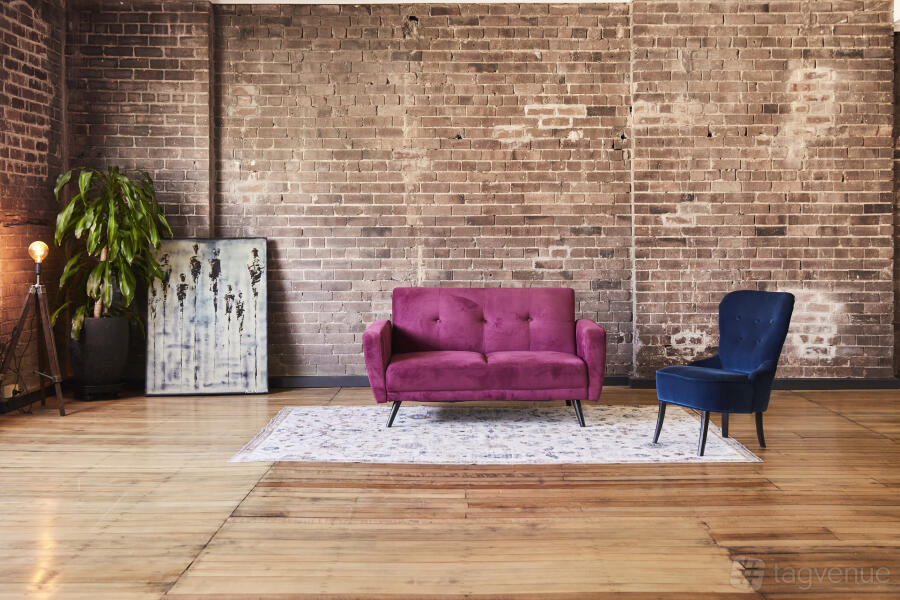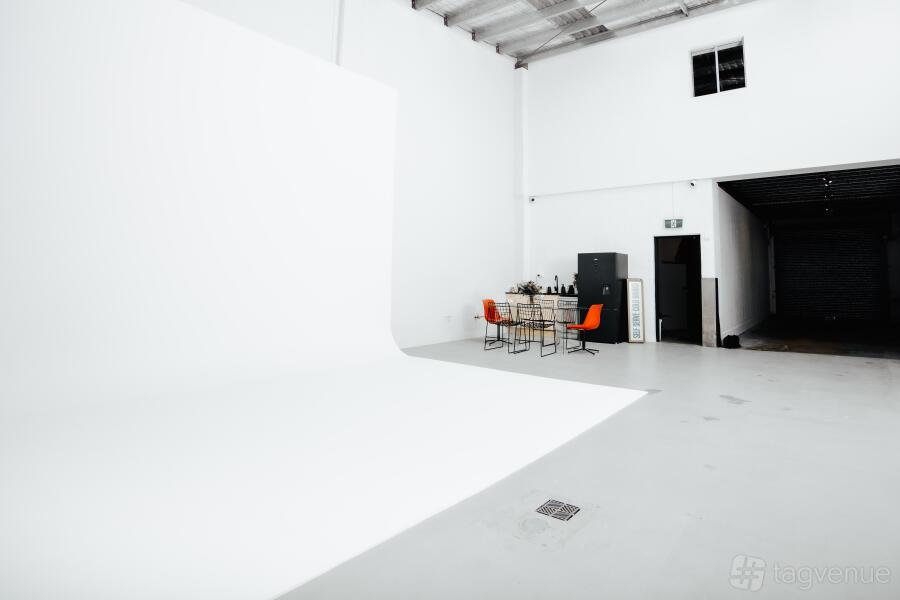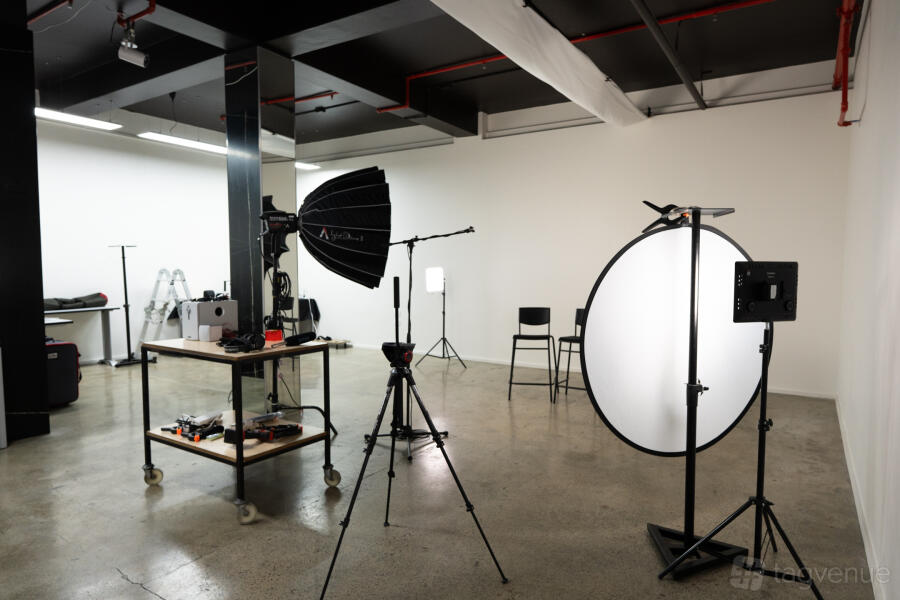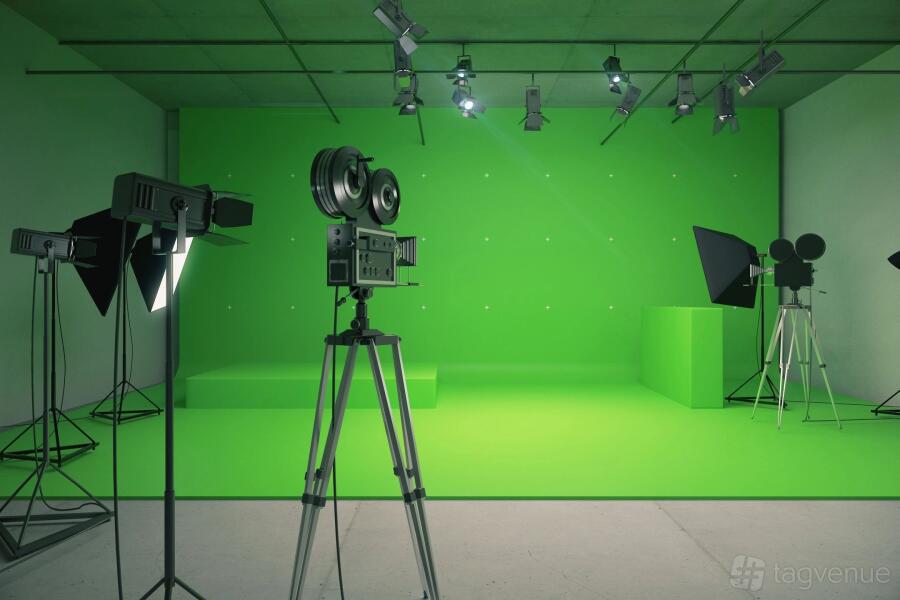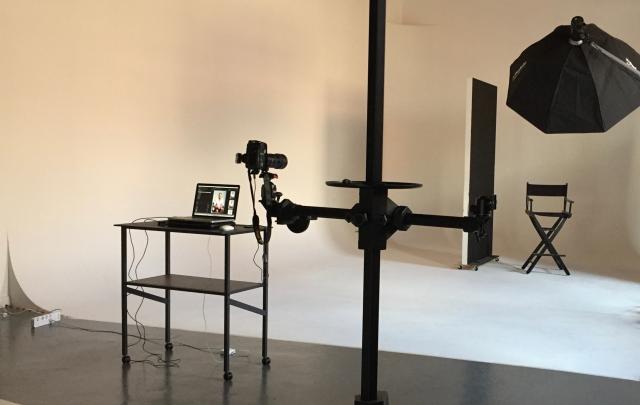Top Film and TV Studios in Sydney
If you’re a professional filmmaker or an amateur doing what you love, Sydney has a fantastic range of film and TV studios and locations ready to meet your needs. Filled with iconic sights and memorable landmarks, the city amazes with its views ready to be captured on camera. And if you’re looking for a studio, you won’t be disappointed with your options either. A simple place for your short film or a professional studio that has all you need? Check out our listings for Sydney’s film and tv studios, set your requirements, and book your studio today!
-
Green Screen / Draper Studio
80 guestsLiverpool Lane StudiosDarlinghurst, Sydney#Supervenue
KKateryna K.
“We had a great time filming at the Green Screen / Draper Studio at Liverpool Lane Studios.”from $165
hire fee / per hour -
The Loft
45 guestsThe DaleChippendale, Sydney#Supervenue
TTom G.
“Which in central Sydney is the same as a 5 star rave review! Hire this space, you won't regret it!”from $110
hire fee / per hour -
Photography Studio
40 guestsLuky StudioWaterloo, SydneyKKim W.
“Large studio with cyc and lots of equipment available. It was perfect for what I needed.”from $66
hire fee / per hour -
Drive Up CYC Warehouse
100 guestsUNO STUDIOSAlexandria, SydneySSuzie P.
“The studio was absolutely perfect and Jordan was extremely helpful and accomodating!”from $145
hire fee / per hour -
Cyclorama Photo Studio
10 guestsMetronome StudiosInner West, Sydney#Supervenue
DDerek A.
“Really good equipment and helpful staff and lots of room to setup and have guests waiting if need be.”from $40
hire fee / per hour -
The Dale Studio
25 guestsThe DaleChippendale, Sydney#Supervenue
SSinem Y.
“Great space, lots of equipment. Kate was super helpful and friendly.”from $100
hire fee / per hour -
Drummoyne Studio
30 guestsPortrait HubDrummoyne, SydneyLLily A.
“Phillipe and Jaydon were wonderful hosts. The space was beautiful and bright with plenty of different spaces.”from $100
hire fee / per hour -
White Photography Studio
20 guestsScroll Stop StudiosAlexandria, Sydney#Supervenue
CCamille
“I needed a place opened late in the day to record online podcast with time difference (with foreign people).”from $40
hire fee / per hour -
Industrial Warehouse Venue
150 guestsUNO STUDIOSAlexandria, SydneySScott E.
“Jordan the owner was a pleasure to deal with, top bloke. Very cool studio space and equipment”from $238
hire fee / per hour -
White Film Studio
25 guestsScroll Stop StudiosAlexandria, Sydney#Supervenue
SSandra K.
“Everything was nice! Thomas was very helpful”from $40
hire fee / per hour -
Film Studio
10 guestsChippen Lane StudiosChippendale, SydneyChippen Lane Studios is a video production studio that incorporates a soundproof film studio, live broadcast capabilities, editing suites, recording studio & projection theatre.from $165
hire fee / per hour -
Studios
40 guestsZen Film and Sound StudioInner West, SydneyJJames E.
“Alan was incredibly friendly and helpful, and offered over-and-above things that I wouldn't have expected.”from $46
hire fee / per hour
- 1
- 2
- 3
- 4
Budget
Event Type
Area type
Venue type
Accessibility features

FAQs about Top Film and TV Studios in Sydney
When searching for a film and television studio, start your hunt with Fox Studios, the city’s largest end-to-end production studio, conveniently located near Anzac Parade not far from the airport. Check out The Docklands Studio near the water, as well as other options in the west, around The Rocks and Haymarket. Cross the Sydney Harbour Bridge and check out the studios on the North Shore, conveniently close to the M1.
Costs for a film and TV studio will vary depending on the size and equipment you will need to hire. For smaller production studios, expect costs to range around $1,000 to $1400 for the standard 8 to 10-hour session. Larger facilities will range upwards to $3500 for half-day hire and $6000 for full-day sessions. Final prices will also include cleaning fees, Saturday surcharges, as well as blackout fees. (All data from Tagvenue.)
Most studios will offer many options for different-sized sound stages, as well as rehearsal spaces and, perhaps, period buildings or special sets. Depending on the size of the setup and your needs they may also offer makeup and dressing rooms as well as space for workshops and props. They may also have an experienced crew available for your production. Cameras, lighting, and other equipment may be included in the cost of smaller studios, however, you will likely need to hire extra equipment depending on your needs.
Yes, you need permission before you start filming in the City of Sydney area. Permission is generally needed for commercial shoots and filming done on public land. If you’re filming on private property you don’t need permission from the City of Sydney, but you do need to submit a filming management plan. In some areas, city permission is not required, but you may need to receive a permit from other authorities. For detailed information on filming permission visit the City of Sydney’s website.
Absolutely! Sydney offers an array of outstanding film studios, and Tagvenue has a curated selection for you to explore. From sleek and modern spaces to charmingly unique spots, you'll find studios that cater to various creative needs. Here are some of our recommendations:
Located on Young Street, this spacious studio is ideal for large-scale productions. It has a 13 m green screen and state-of-the-art lighting equipment, making it perfect for creating visually incredible films. It also has 100 seats, which is excellent for hosting screenings or film-related events.
Only a short walk from Wynyard Station, this space is suitable for smaller-scale productions. It also has a versatile setup with adjustable lighting options. Whether you're shooting local news, interviews, or product demos, it provides a flexible and customisable space to meet your specific production needs.
Situated in the bustling CBD (Central Business District), its location ensures easy accessibility for crew and talent. Additionally, with its affordable price, starting from $66 per hour, this place is a budget-friendly option for filmmakers. Moreover, the experienced staff can assist with technical needs or questions, ensuring a smooth and efficient production process!
Your Guide to Hiring Film and TV Studios in Sydney
As a filming hub to one of the largest TV and film production industries in the world, Sydney welcomes all filmmakers. This dynamic and exciting city allows for the biggest productions, but also most thrilling short forms. In Sydney, there is space for everyone to showcase their talents, skill, and artistry. You won’t be disappointed if you decide to set your filming here.
But starting on a new project may be a daunting task. Tagvenue is here to help you bring your vision to life.
Here are some tips to help you start with your shoot.
The preparations. When you’re taking on a new project, begin with a plan. Carefully think about what the project is about, how long it will take and what will you need to finish it. Start with a script and a storyboard. Set it out scene by scene. This way you will know what kind of equipment you will need, what the crew has to be doing, and if there’s anything you should be extra careful about. If you know what you will need at the very start of the project the delivery will be worry-free for you and you won’t miss out on anything.
The time. The preparations, transportation, any re-shooting, and post production are a part of your project and need enough time to be completed. Schedule in some extra hours or, if you can, even days, for any delays that might occur. You want to work fast and efficiently, but not rush under pressure. It’s always better to finish earlier than to say sorry for the postponement.
The crew. Look at your plan and see how many people will be on your crew. If you’re doing a live stream on your own channel or recording a presentation for your class, perhaps you can film them on your own. But if your project is a bigger one, make sure you have all the professional help you may need. Depending on the type and size of your production, the crew might look different, but make sure you have at least a producer, light and sound technician, hair and make-up artist or product stylist, and any other professional that is essential for successful shooting. If the project is a big one consider hiring an assistant, who will keep an eye on everything while you shoot your film.
The equipment. Once you know what you’re filming you need to decide what kind of equipment you need. If you’re working with your own gear, prepare it beforehand. Check if all the items work properly and if you have everything you need to film the project you will be working on. A few days before the shoot, double check your equipment and make sure that you are not missing anything. If you don’t have your own gear and you’re filming outdoors look for companies that can rent out the necessary equipment. If you decide on shooting indoors, look for a film studio that provides in-house equipment for you to use.
The location. The right location is an important element in your filmmaking. Whether it’s indoors or outdoors make sure the place meets all the requirements for your production. Depending on how much equipment and how many of the crew you will be bringing with you, see if the place you chose will fit all that you need to have on set. If you’re shooting in a studio, check if it’s soundproof, so that your production doesn’t disturb anyone, but also - that no unwanted noise gets into your film. If the studio you’re hiring has its own equipment make sure you will be able to use it and that it has everything you need. Adapt the location to your needs as much as possible. Before you make your final decision on the location though, you may want to visit it to see it with your own eyes. Check the reviews as well. What you can’t see at the first glance, others will share with you.
The rehearsals. Even if you’re a professional doing your 1000th shoot, you can never go wrong with a rehearsal. Prepare the equipment, the crew, and the actors. Look for anything that could be problematic in the final filming. During the rehearsal, you may see that the scene you had in your head doesn’t play out as well as you thought it will. A practice session will save you time and money and you will avoid reshoots.
The final result. Focusing on the final result will help you carry out the project without unnecessary pauses. Knowing what you want to get at the end will help you adjust your work if any unexpected occurrences appear on the way. It will also help you stay on track with the work. A solid and focused leader is necessary for the project to be successful.
So, lights, camera, action - now you’re ready to film!

